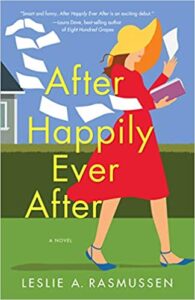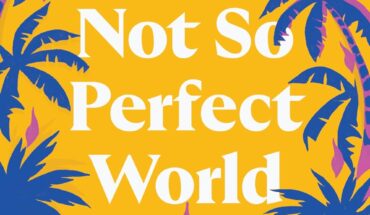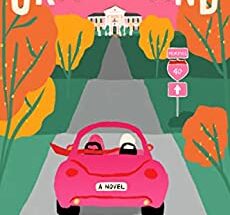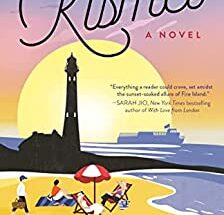 In her charming new novel, After Happily Ever After, Leslie Rasmussen’s main character deals with issues familiar to many middle-aged women and probably some men, too: children leaving the nest, ailing parents, a long-term marriage in need of rebooting, career regrets. But with Rasmussen’s background in television comedy writing, what could be depressing or maudlin is infused with humor. In the novel, 45-year old Maggie begins to rethink her life and her marriage in the months leading up to her daughter’s departure for college. Having given up a career to be a full-time mom, she wonders what might have been if she’d stayed in her publishing job. She also wonders what might be when she meets a cute guy at the gym – especially since her husband has been too distracted lately to pay much attention to her. After Happily Ever After deals with the universal topics of growing older, saying goodbye to the people we love, sex and marriage, and the constantly evolving nature of life with both lightheartedness and poignancy.
In her charming new novel, After Happily Ever After, Leslie Rasmussen’s main character deals with issues familiar to many middle-aged women and probably some men, too: children leaving the nest, ailing parents, a long-term marriage in need of rebooting, career regrets. But with Rasmussen’s background in television comedy writing, what could be depressing or maudlin is infused with humor. In the novel, 45-year old Maggie begins to rethink her life and her marriage in the months leading up to her daughter’s departure for college. Having given up a career to be a full-time mom, she wonders what might have been if she’d stayed in her publishing job. She also wonders what might be when she meets a cute guy at the gym – especially since her husband has been too distracted lately to pay much attention to her. After Happily Ever After deals with the universal topics of growing older, saying goodbye to the people we love, sex and marriage, and the constantly evolving nature of life with both lightheartedness and poignancy.
Tell me about your background as a TV writer. Where might we have seen your TV work?
I had been working at MTM studios for a few years as an assistant on Hill Street Blues, when I thought it would be fun to try to write sitcoms. After writing many spec scripts and trying to perfect the craft, a woman writer I had met on the Newhart show on the lot took me under her wing and helped me get an agent, and then the two of them helped me get my first script on the TV show, Major Dad. After I got that script, I quit my assistant job and began earning a living as a sitcom writer. I wrote for the shows Roseanne, Evening Shade, The Good Life (with Drew Carey) and Norm McDonald’s show. I was also on staff on a short series called The Ties that Bind, with Ralph Macchio, and Sweet Valley High. I also helped on a lot of pilots and wrote an episode of the animated show The Wild Thornberrys.
Your chops in sitcoms really shows in your snappy dialogue and humor in the book. Have you always written comedy?
Everything I’ve written since I was young has had some kind of humor in it. Even the letters I wrote home from camp were filled with the comedic timing of a teenager. I enjoy writing banter between characters, and even when I write dramatic scenes, I will often put in some comedic undertones. In life even when there’s conflict, often it is mitigated by humor.
How was it for you to transition from TV writer to novel writer?
The transition was actually not an easy one. I love writing, so the writing part of it wasn’t the issue, it was the format part. A thirty-minute television script is about forty double spaced pages, while a novel is closer to three hundred single-spaced pages. Learning how to write a story arc that takes you all the way through to the end of a novel is far more difficult. I had to teach myself how to write an outline that encompassed much more than a short A or B story of a sitcom script. Also, in television you can rely on the actors to portray a character in a certain way, the wardrobe people to dress that actor, and the set decorators to set the scene. In a book, all those visuals are in the writers’ head and need to get down on paper, so their readers will be able to understand who the characters are.
Any writers/books that inspired you on your writing journey?
I love to read, so when it came to writing, I felt like the more I studied scripts or novels, the more I’d learn. I’m one of those people who likes to just write a lot and learn from my mistakes. That being said, I did read a few books, one of which was Robert McKee’s book on Screenwriting, the other was Bird by Bird by Anne Lamott, and The Hero’s Journey by Joseph Campbell.
I’m sure a lot of women will relate to the main character Maggie’s situation in your book, in terms of hitting a mid-life crisis with kids leaving for college, taking care of ailing parents, and feeling stuck in a marriage. What inspired you to write about this and is it at all autobiographical? What, in particular, resonates for you from the book?
Although the novel deals with situations that I think most women at some time in their life go through, After Happily Ever After is not autobiographical. When I stopped writing television to raise my two sons, I was surrounded by other moms who found themselves in similar situations that I put Maggie in. Originally, I was going to write a non-fiction book, so I created and posted online a survey that asked women questions about their long-term relationships, how they and their partner handled conflict within those relationships, what their romantic lives were like, if there was any jealousy within themselves and their partners, and about their sex lives. The surveys were all done anonymously. At the same time, I also interviewed women I knew. After analyzing all the data, I realized that so many of the women shared the same issues. When I sat down to write the book, I decided to make it fiction and to create Maggie as an amalgam of all the women I had studied. As the story was coming together in my mind, I wanted to add Maggie’s aging parents. Many of the women I knew in their forties and fifties, were also dealing with the stress of helping out their elderly parents. My main goal in writing this book, was to work on a story and characters that women could relate to.
Were the characters informed at all by people you know in real life? Children? Husband? Parents?
The other characters in the book are also fictional. The only character that is remotely informed by anyone in my life is Maggie’s father. My father passed away four years ago. He had some health issues that plagued him for the last six years of his life and my mother was his caregiver. In the book, Maggie’s father has very different health issues than my father had, but he is portrayed as a good man who has a special relationship with Maggie, and I had a special relationship with my father. I chose to have Maggie have a teenage daughter for two reasons. One is because I wanted her daughter to reflect back to Maggie a strength that Maggie didn’t have with men, and also because I have two sons, and I didn’t want them to think I was writing about them.
What was your path to publication like?
The path to publication, as any author will tell you, is not an easy one. When I worked in television, if you got a paying job, then you could get an agent fairly easily. Nowadays it’s vastly different, and agents are extremely hard to attain. When my novel was finished, I sent a query letter to quite a few agents, and while I received a lot of nice rejection letters, they were still rejections. Book publishing was a whole new world for me, so I wasn’t sure what to do. I went to the Kauai Writers Conference, and not only did I get a wonderful education in writing and revisions from authors Christina Baker Kline, Kristin Hannah, and Josh Mohr, but I met Brooke Warner, head of She Writes Press. After I got back, I emailed Brooke and asked her if she would take a look at my manuscript. She agreed, and liked it, and decided that She Writes would publish it.
Did you have a book tour or launch party that had to be cancelled due to Covid?
My book wasn’t going to be out until April 6, 2021, so I knew whatever I did for a launch party or book tour was probably going to be virtual. I didn’t have to cancel anything because I hadn’t set anything up yet. I planned a virtual launch party and was interviewed by Amy Silverberg who’s a writer and stand-up comedian. It was a fun event where friends, family and many authors joined the Zoom.
Are you and your publisher doing anything different instead of a book tour to promote your novel?
My publicist has set up a blog tour, podcasts, Facebook Live interviews, and a lot of media that have promoted the book and/or reviewed it.
On a lighter note, do you have any quirky writing rituals?
I have rituals, but I’m not sure they’re quirky. After I wake up, I exercise for forty-five minutes, then I shower, eat breakfast, make my coffee, and sit down to write.
What are you reading now?
Right now, I’m almost finished reading a really good book, A Boob’s Life by Leslie Lehr. Leslie wrote a nice blurb for my book, and she’s going to be attending the next meeting of my book club.
What are you working on next?
I am about half-way through a new book which is about two young women from very different backgrounds who find themselves thrown together as they navigate the most difficult decisions of their lives. I also have a new article in Huffington Post titled, This is What No One Tells You About Going Through Menopause.
This is her debut novel.



